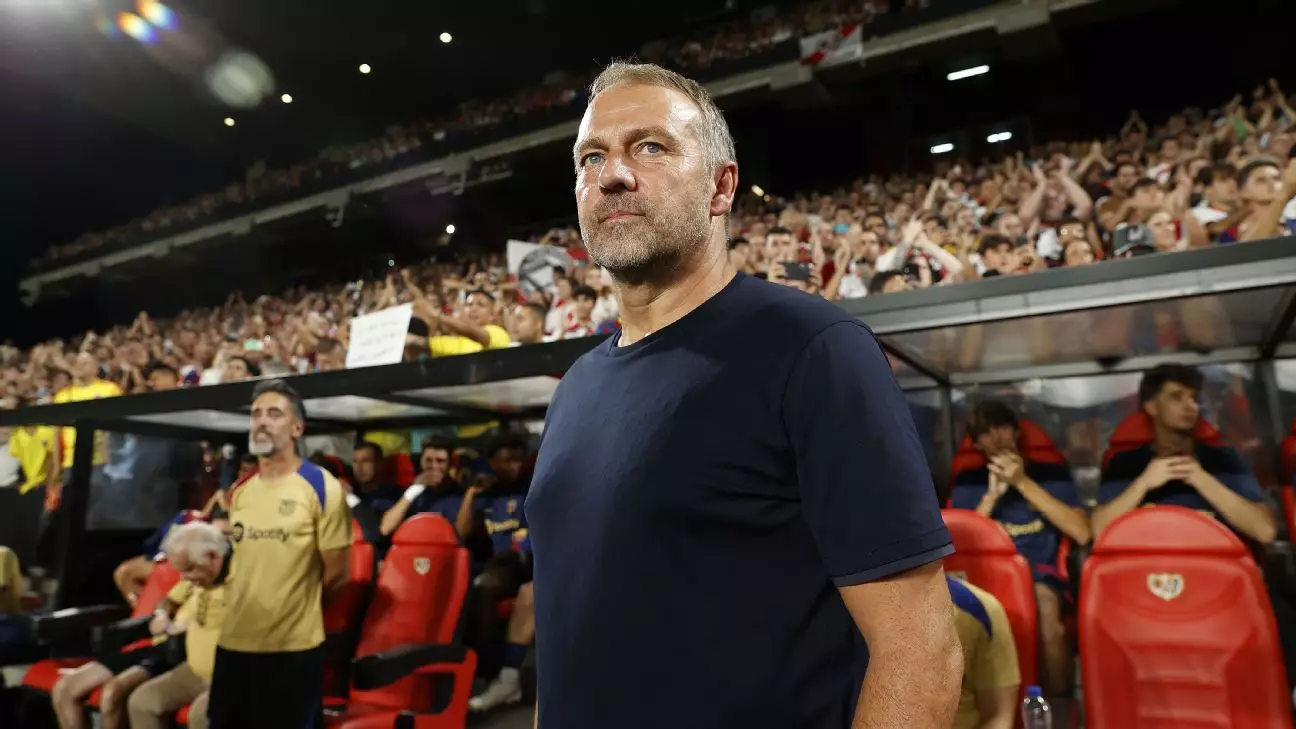Barcelona’s recent defeat to Osasuna marked a significant turning point for the club this season. Coming off a resounding streak of seven consecutive wins in La Liga, the team’s 4-2 loss exposed vulnerabilities that had largely been masked by their winning form. Coach Hansi Flick, while acknowledging the squad’s need for rotation, took the blame for the dire outcome, citing the heavy toll of their grueling schedule as a key factor. This incident highlights the delicate balancing act coaches must perform between squad rotation and maintaining team cohesion.
Flick’s strategy to rest key players like Lamine Yamal and Raphinha may have seemed prudent, especially considering the congested football calendar that players face. However, the repercussions of these changes were immediate. Flick’s post-match confession underlines the complexities of team management; he recognized that while he needed to ensure player fitness, the wholesale changes ultimately disrupted the team’s rhythm. It serves as a reminder that over-rotation can detrimentally impact a team’s performance, especially when key players have developed specific on-field partnerships that can be difficult to replicate.
The match against Osasuna exposed not only the consequences of player rotation but also some tactical missteps that unfolded during the game. Barcelona initially struggled to adapt to a fluid Osasuna side, falling behind early to Ante Budimir’s header. The team’s defensive frailties were glaring, with the young center-back Sergi Domínguez caught out by Osasuna’s quick transitions. Such defensive lapses, coupled with indecision in midfield, created an uphill battle for Barcelona that was compounded as the match wore on.
Flick’s decision to employ a makeshift backline, with players out of their natural positions, backfired. The reliance on youngsters, while essential for squad development, leaves room for inconsistency, particularly in high-stakes matches. Flick’s frank evaluation post-game, in which he expressed his intention to analyze the referee’s decisions, also indicates a certain level of deflection from the deeper issues at play within his tactical setup. While refereeing decisions can certainly influence a game, fixing internal errors should take precedence if Barcelona hopes to maintain their standing atop La Liga.
The Road Ahead: Optimism Amidst Adversity
Despite the loss, Flick opted for a perspective rooted in optimism, emphasizing the positive trajectory of the team. He recognized the return of injured key players like Dani Olmo and Frenkie de Jong as a potential turning point for Barcelona moving forward. In the face of adversity, such a mentality is imperative for maintaining morale within the squad. Flick’s focus on upcoming fixtures, particularly in the Champions League against Young Boys, illustrates his commitment to turning lessons learned into motivation.
Moreover, Flick’s intention to stay the course regarding his squad selection and tactical philosophy indicates a willingness to learn from past failures rather than drastically alter his approach. In modern football, where coaches are often scrutinized after defeats, this measured approach can garner respect from players and fans alike. However, maintaining this balance will require a rigorous assessment of team performance and an adaptable strategy tailored to opponents, especially given the unpredictable nature of Champions League football.
Barcelona’s defeat serves as a critical reflection point in their season. While Flick’s commitment to nurturing squad depth is commendable, the ramifications of over-rotation must be carefully considered. The emphasis on a collective team spirit and on-field cohesion is non-negotiable if they wish to achieve consistent performance.
As the players gear up for their next matches, the lessons learned from the setback at Osasuna should serve as a foundation for growth. The blend of youthful exuberance and experienced leadership may yet define Barcelona’s season, but finding that equilibrium amid the pressure will be key to securing future success. Ultimately, the defeat can either be a stumbling block or a stepping stone, depending on how the team chooses to respond in their upcoming challenges. The upcoming fixtures against Young Boys and Alavés will demonstrate whether Flick’s squad can rally from this adversity and reinforce their title ambitions as they continue to chase glory in La Liga and beyond.

